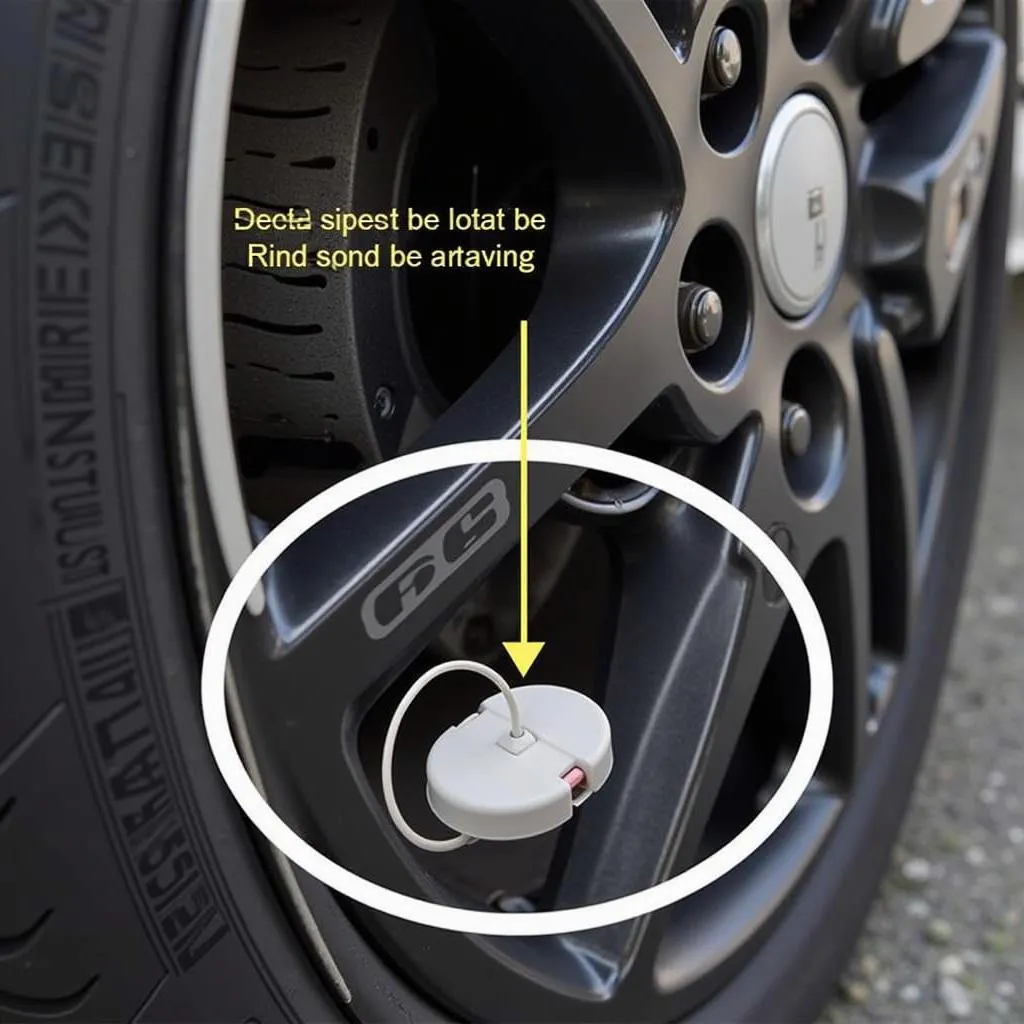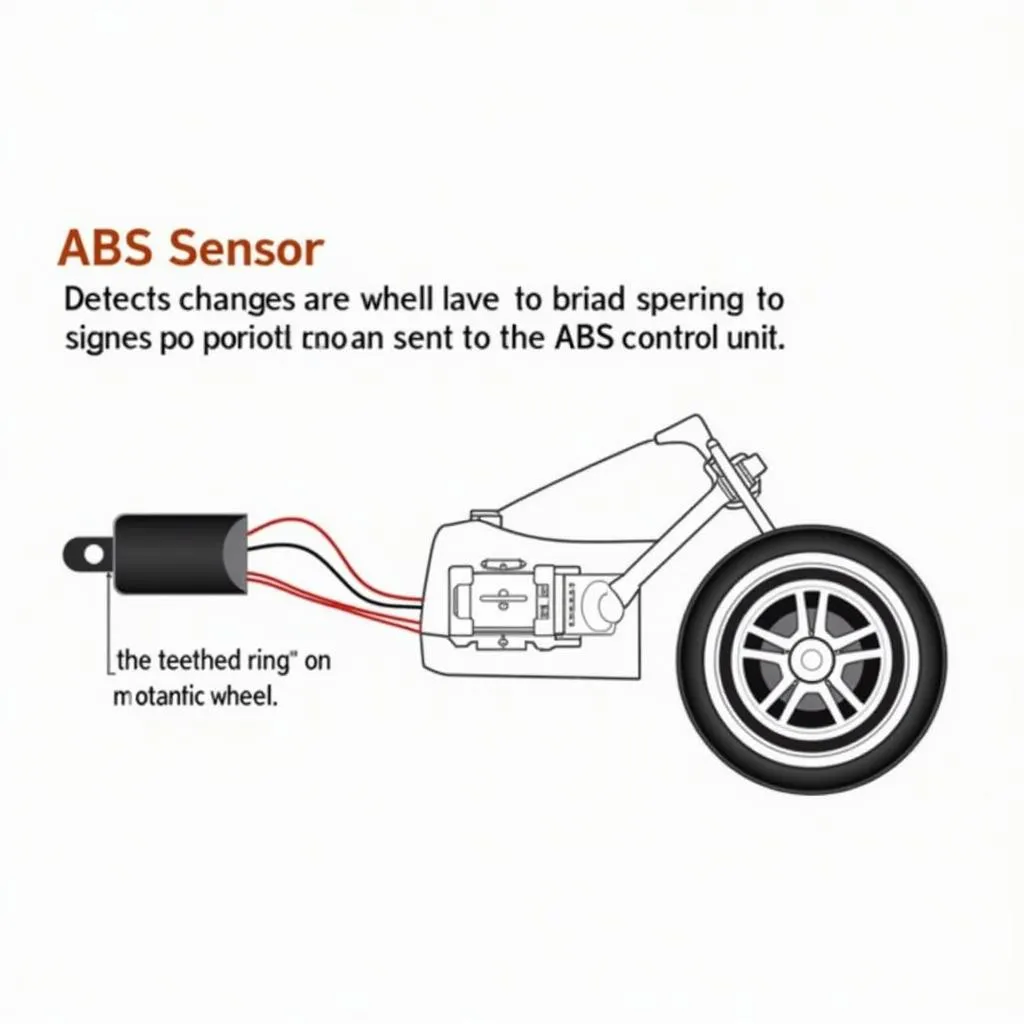The ABS sensor, short for Anti-lock Braking System sensor, is a critical component of your vehicle’s safety system. These sensors play a vital role in preventing your wheels from locking up during hard braking, allowing you to maintain steering control and avoid potential accidents.
 ABS sensor location
ABS sensor location
How Does an ABS Sensor Work?
An ABS sensor utilizes electromagnetic technology to monitor the rotational speed of each wheel. Here’s a simplified breakdown:
- Magnetic Field: Each wheel houses a toothed tone ring or a magnetic encoder ring.
- Sensor Detection: The ABS sensor, positioned near this ring, detects changes in the magnetic field as the teeth pass by.
- Signal Generation: These variations generate signals that are sent to the ABS control unit (ECU).
- Data Interpretation: The ECU continuously analyzes the speed signals from all four wheels.
- Brake Pressure Modulation: If the ECU detects a wheel is about to lock up during braking, it rapidly adjusts the brake pressure to that specific wheel. This prevents skidding and allows for controlled braking.
 ABS sensor working principle
ABS sensor working principle
Common ABS Sensor Problems and Symptoms
ABS sensors, despite their robust design, can encounter issues over time. Recognizing the symptoms of a failing ABS sensor is crucial for your safety:
- Illuminated ABS Warning Light: The most common indicator, this light on your dashboard signals a potential problem within the ABS system, often related to a faulty sensor.
- Erratic Braking Response: Experiencing unusual pulsations or vibrations in the brake pedal during braking, particularly at low speeds, could suggest a malfunctioning ABS sensor.
- Wheel Speed Sensor Malfunction: Some vehicles might display a specific warning related to the wheel speed sensor, directly indicating a problem with the ABS sensor.
- Compromised ABS Functionality: In severe cases, a completely failed ABS sensor can disable the entire ABS system, increasing the risk of wheel lock-up during hard braking.
If you notice any of these signs, it’s crucial to have your vehicle inspected by a qualified mechanic.
Importance of Maintaining Your ABS Sensors
Regular maintenance of your car’s braking system, including the ABS sensors, is vital for ensuring optimal performance and safety on the road.
- Timely Inspections: Incorporate ABS sensor checks during your routine vehicle maintenance. A mechanic can diagnose potential issues early on.
- Careful Cleaning: Dirt, debris, or rust accumulation on the sensor can disrupt its functionality. Gently clean the sensors during brake inspections.
- Professional Repairs: If you suspect a faulty sensor, seek professional repair or replacement to avoid compromising your vehicle’s safety features.
ABS Sensor vs. Wheel Speed Sensor: Are They the Same?
While often used interchangeably, there’s a technical distinction between an ABS sensor and a wheel speed sensor. In essence, the ABS sensor is a type of wheel speed sensor, but with a dedicated purpose.
- Wheel Speed Sensors: Provide information on wheel speed to various vehicle systems, including traction control, stability control, and speedometer readings.
- ABS Sensors: Specifically designed for the Anti-lock Braking System, sending wheel speed data to the ABS control unit to prevent wheel lockup.
In modern vehicles, ABS sensors commonly serve the dual function of both wheel speed sensors and ABS sensors. However, the distinction remains relevant in understanding the specific role they play within the ABS system.
FAQs About ABS Sensors in Cars
1. How long do ABS sensors usually last?
ABS sensors are designed for durability but typically have a lifespan of around 75,000 miles or more. However, driving conditions and external factors can influence their longevity.
2. Can I drive with a bad ABS sensor?
While your car might seem drivable with a faulty ABS sensor, it’s highly discouraged. It compromises your safety, particularly during emergency braking.
3. How much does it cost to replace an ABS sensor?
The cost varies depending on your car model and labor charges. On average, expect to pay between $100 to $300 per sensor for replacement.
4. Can I replace an ABS sensor myself?
Replacing an ABS sensor involves technical know-how and requires specific tools. It’s recommended to have it done by a professional mechanic to ensure proper installation and calibration.
5. How can a Thinkdiag scanner help diagnose ABS sensor problems?
A Thinkdiag scanner is a powerful diagnostic tool that can read and interpret fault codes from your car’s ECU, including those related to the ABS system. It can help pinpoint the exact problem, saving time and potentially costly misdiagnoses.
Conclusion
Understanding the critical role of your car’s ABS sensors is paramount for safe driving. These sensors, working in conjunction with the entire ABS system, provide an additional layer of safety, especially in emergency situations. Regular maintenance, prompt attention to warning signs, and using advanced diagnostic tools like the Thinkdiag scanner ensure your ABS system remains in optimal condition, keeping you and your passengers safe on the road.
If you’re experiencing issues with your ABS system, or if your abs light keeps coming on and off, don’t hesitate to reach out for expert help. Contact us via WhatsApp: +1(641)206-8880, Email: [email protected] or visit us at 276 Reock St, City of Orange, NJ 07050, United States. We are available 24/7 for your assistance.